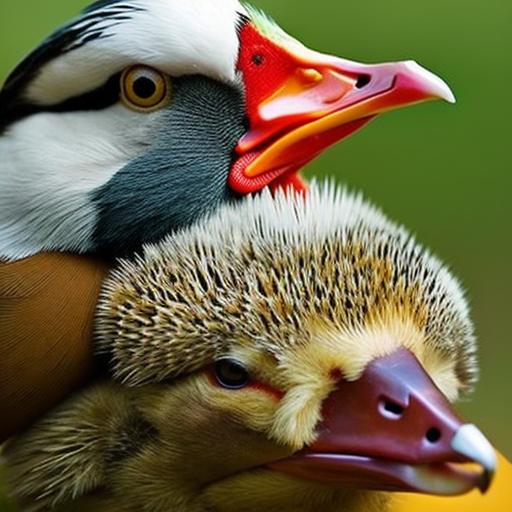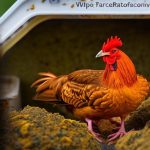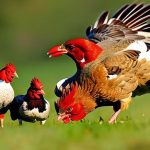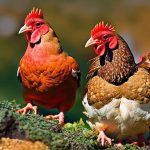Keeping ducks and chickens together is a growing trend among backyard farmers. This practice offers several benefits, including pest control and increased egg production. However, there are also important factors to consider before introducing ducks to an existing chicken flock. In this article, we will explore the benefits of keeping ducks and chickens together, discuss the factors to consider, and provide recommendations for the best duck and chicken breeds to cohabitate. We will also cover housing requirements, feeding needs, and health considerations for both species.
Key Takeaways
- Keeping ducks and chickens together can provide a variety of benefits, including pest control, egg production, and entertainment.
- Before keeping ducks and chickens together, it’s important to consider factors such as breed compatibility, housing requirements, and feeding needs.
- Some of the best duck breeds to keep with chickens include Pekin, Rouen, and Muscovy, while good chicken breeds to keep with ducks include Rhode Island Red, Plymouth Rock, and Sussex.
- Housing requirements for ducks and chickens should include separate areas for nesting, roosting, and swimming, as well as protection from predators.
- Feeding requirements for ducks and chickens can vary, but both should have access to a balanced diet that includes grains, vegetables, and protein sources. Health considerations should also be taken into account, such as regular check-ups and vaccinations. Ultimately, whether or not keeping ducks and chickens together is right for you will depend on your individual circumstances and preferences.
Benefits of Keeping Ducks and Chickens Together
One of the main benefits of keeping ducks and chickens together is pest control. Ducks are excellent foragers and will eat insects, slugs, and other pests that can harm your garden or crops. By allowing ducks to roam freely with your chickens, you can reduce the need for chemical pesticides and create a more natural pest control system.
Another benefit is increased egg production. Ducks are known for their high egg-laying capabilities, and by keeping them with chickens, you can have a diverse range of eggs. This can be especially beneficial if you sell eggs or enjoy having a variety of eggs for cooking and baking.
Many backyard farmers have shared their positive experiences with keeping ducks and chickens together. They have noticed that the two species get along well and even form social bonds. Some farmers have reported that their ducks and chickens will sleep together in the same coop or nest together during the day. This camaraderie can create a harmonious environment in your backyard farm.
Factors to Consider Before Keeping Ducks and Chickens Together
Before introducing ducks to an existing chicken flock, there are several factors to consider. First, you need to ensure that you have enough space for both species. Ducks require more space than chickens as they are larger and need room to roam and access to water for swimming. It is recommended to have at least 10 square feet per duck in the outdoor area.
Temperament is another important factor to consider. Ducks and chickens have different behaviors and social structures. Chickens are more hierarchical and may peck at ducks, especially if they feel threatened or if there is competition for resources. It is important to monitor their interactions and provide enough space and resources to minimize aggression.
Dietary needs should also be taken into account. Ducks have different nutritional requirements than chickens, particularly when it comes to niacin. Ducks need higher levels of niacin in their diet, which can be provided through specialized duck feed or by adding niacin supplements to their food. It is important to ensure that both species have access to appropriate feed and water sources.
When introducing new birds to an existing flock, it is recommended to do so gradually. This can be done by keeping the new birds in a separate enclosure within the same area as the existing flock. This allows them to see and interact with each other without direct contact. After a period of observation, you can gradually introduce them to each other under supervision, ensuring that there are enough resources for all birds.
Best Duck Breeds to Keep with Chickens
When choosing duck breeds to keep with chickens, it is important to select breeds that are compatible in terms of size and temperament. Some of the best duck breeds for cohabitation with chickens include Pekin ducks and Khaki Campbell ducks.
Pekin ducks are a popular choice for backyard farmers due to their friendly nature and high egg production. They are also larger in size, which makes them less likely to be bullied by chickens. Pekin ducks are known for their white feathers and orange bills, making them easily recognizable.
Khaki Campbell ducks are another excellent choice for cohabitation with chickens. They are known for their high egg-laying capabilities, often producing up to 300 eggs per year. Khaki Campbells are also relatively calm and adaptable, making them a good fit for a mixed flock.
Best Chicken Breeds to Keep with Ducks
When selecting chicken breeds to keep with ducks, it is important to choose breeds that are not overly aggressive and can tolerate the presence of ducks. Some of the best chicken breeds for cohabitation with ducks include Rhode Island Reds and Plymouth Rocks.
Rhode Island Reds are a popular choice among backyard farmers due to their hardiness and versatility. They are known for their excellent egg-laying capabilities and friendly temperament. Rhode Island Reds are also relatively calm and can coexist well with ducks.
Plymouth Rocks are another suitable choice for cohabitation with ducks. They are known for their docile nature and adaptability to different environments. Plymouth Rocks are also good layers, producing a consistent supply of eggs throughout the year.
Housing Requirements for Ducks and Chickens
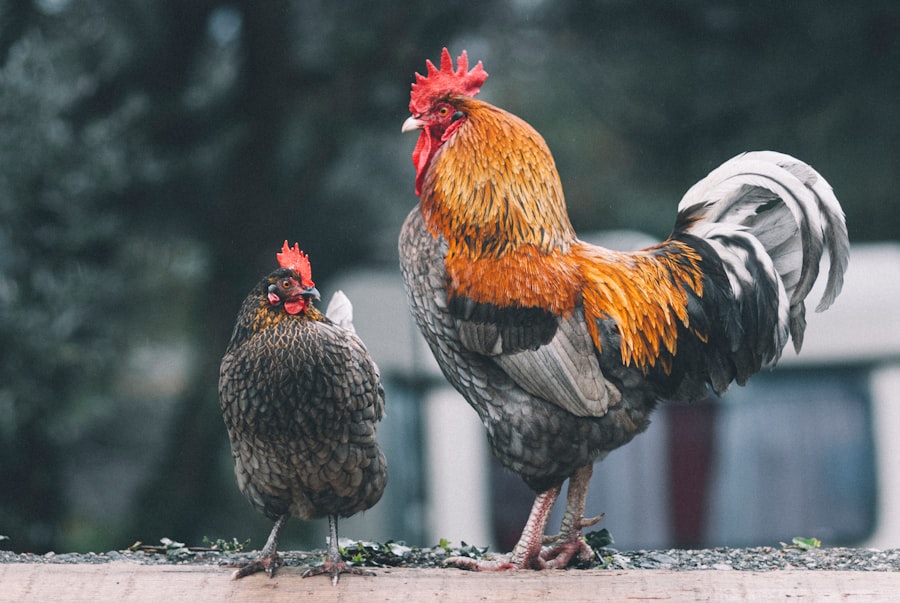
When it comes to housing requirements, it is important to provide separate areas for nesting and roosting for both ducks and chickens. Ducks require access to water for swimming, so it is recommended to have a separate area or pond where they can fulfill this need. This can be as simple as a small kiddie pool or a larger pond depending on the number of ducks you have.
For nesting, both ducks and chickens require separate areas where they can lay their eggs in peace. This can be achieved by providing individual nesting boxes or separate sections within the coop. It is important to ensure that the nesting areas are clean, comfortable, and easily accessible for both species.
Roosting areas should also be provided for chickens, as they prefer to sleep off the ground. This can be in the form of perches or elevated platforms within the coop. Ducks, on the other hand, do not require roosting areas as they prefer to sleep on the ground.
Recommended Coop Size for Ducks and Chickens
The recommended coop size for ducks and chickens depends on the number of birds being kept. As a general guideline, it is recommended to have at least 4 square feet per chicken and 10 square feet per duck in the indoor area of the coop. This allows for enough space for the birds to move around comfortably.
If you have a small coop, there are ways to maximize space. For example, you can use vertical space by adding perches or platforms for chickens to roost on. You can also use nesting boxes that are stacked or mounted on the walls to save floor space. Additionally, providing access to an outdoor area or run can give the birds more space to roam and reduce overcrowding in the coop.
Feeding Requirements for Ducks and Chickens
Ducks and chickens have different dietary needs, so it is important to provide them with appropriate feed. Chickens require a balanced diet that includes a mix of grains, protein, vitamins, and minerals. There are various commercial chicken feeds available that meet these requirements.
Ducks, on the other hand, require higher levels of niacin in their diet. This can be provided through specialized duck feed or by adding niacin supplements to their food. It is important to ensure that ducks have access to water while eating as they need it to help swallow their food.
When feeding both species together, it is recommended to provide separate feeding areas or stations. This helps prevent competition for food and ensures that each bird gets their fair share. It is also important to monitor their feeding habits and adjust the amount of feed accordingly to prevent overeating or underfeeding.
Health Considerations for Ducks and Chickens
When keeping ducks and chickens together, there are several health considerations to keep in mind. One of the main concerns is the risk of disease transmission between species. Ducks and chickens can carry different pathogens that may not affect them but can be harmful to the other species.
To minimize the risk of disease transmission, it is important to practice good biosecurity measures. This includes keeping the coop and surrounding areas clean, providing clean water sources, and regularly monitoring the health of the birds. It is also recommended to quarantine new birds before introducing them to an existing flock to ensure that they are healthy and free from any diseases.
Common health issues that can affect both ducks and chickens include respiratory infections, parasites, and nutritional deficiencies. It is important to be familiar with the signs of illness in both species and seek veterinary care if needed. Regular health checks and preventive measures such as vaccinations can also help maintain the overall health of the flock.
Is Keeping Ducks and Chickens Together Right for You?
Keeping ducks and chickens together can be a rewarding experience for backyard farmers. It offers several benefits, including pest control and increased egg production. However, there are important factors to consider before introducing ducks to an existing chicken flock.
Factors such as space, temperament, and dietary needs should be taken into account. It is also important to choose the right duck and chicken breeds that are compatible in terms of size and temperament. Providing appropriate housing, feeding, and healthcare for both species is essential for their well-being.
In conclusion, keeping ducks and chickens together can be a successful endeavor if done with careful consideration and planning. By following the recommendations in this article, you can create a harmonious environment where both species can thrive and contribute to your backyard farm.
If you’re considering keeping ducks and chickens together, it’s important to choose the right breeds that can coexist harmoniously. While chickens and ducks have different needs and behaviors, some breeds are known to be more compatible than others. In a recent article on Poultry Wizard, they discuss the best ducks to keep with chickens, providing valuable insights and recommendations for successful integration. If you’re interested in learning more about this topic, check out their informative article here. Additionally, if you’re looking for other helpful resources on chicken coop door size, a heater for a chicken coop, or turning a shed into a chicken coop, Poultry Wizard has got you covered with their comprehensive guides: Chicken Coop Door Size, Heater for a Chicken Coop, and Turning a Shed into a Chicken Coop.
FAQs
What are the best duck breeds to keep with chickens?
Some of the best duck breeds to keep with chickens include Pekin, Rouen, Khaki Campbell, and Indian Runner ducks.
Why should I keep ducks with chickens?
Keeping ducks with chickens can provide a number of benefits, including increased pest control, improved soil health, and enhanced egg production.
What are some things to consider before keeping ducks with chickens?
Before keeping ducks with chickens, it’s important to consider factors such as space requirements, dietary needs, and potential health risks.
How do I introduce ducks to my existing flock of chickens?
To introduce ducks to an existing flock of chickens, it’s important to do so gradually and under close supervision. Providing separate feeding and watering stations can also help prevent conflicts.
What are some potential health risks associated with keeping ducks and chickens together?
Some potential health risks associated with keeping ducks and chickens together include the spread of diseases such as avian influenza and the potential for parasites such as mites and lice to affect both species. Proper sanitation and hygiene practices can help minimize these risks.
Meet Walter, the feathered-friend fanatic of Florida! Nestled in the sunshine state, Walter struts through life with his feathered companions, clucking his way to happiness. With a coop that’s fancier than a five-star hotel, he’s the Don Juan of the chicken world. When he’s not teaching his hens to do the cha-cha, you’ll find him in a heated debate with his prized rooster, Sir Clucks-a-Lot. Walter’s poultry passion is no yolk; he’s the sunny-side-up guy you never knew you needed in your flock of friends!

